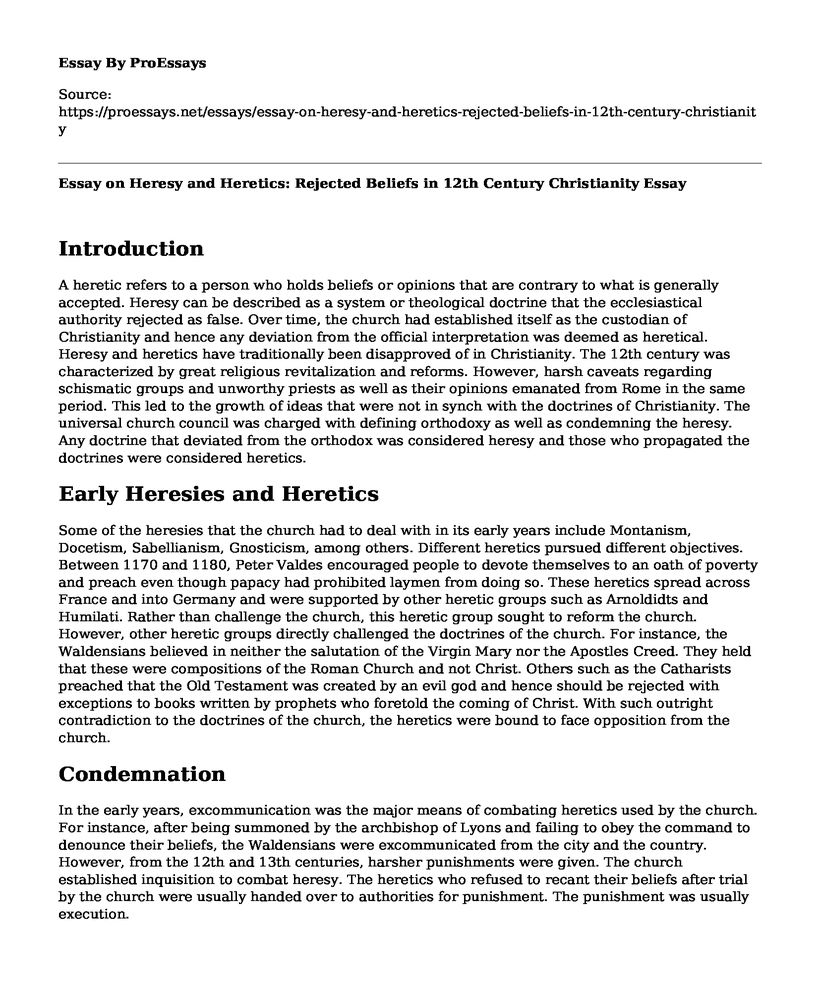Introduction
A heretic refers to a person who holds beliefs or opinions that are contrary to what is generally accepted. Heresy can be described as a system or theological doctrine that the ecclesiastical authority rejected as false. Over time, the church had established itself as the custodian of Christianity and hence any deviation from the official interpretation was deemed as heretical. Heresy and heretics have traditionally been disapproved of in Christianity. The 12th century was characterized by great religious revitalization and reforms. However, harsh caveats regarding schismatic groups and unworthy priests as well as their opinions emanated from Rome in the same period. This led to the growth of ideas that were not in synch with the doctrines of Christianity. The universal church council was charged with defining orthodoxy as well as condemning the heresy. Any doctrine that deviated from the orthodox was considered heresy and those who propagated the doctrines were considered heretics.
Early Heresies and Heretics
Some of the heresies that the church had to deal with in its early years include Montanism, Docetism, Sabellianism, Gnosticism, among others. Different heretics pursued different objectives. Between 1170 and 1180, Peter Valdes encouraged people to devote themselves to an oath of poverty and preach even though papacy had prohibited laymen from doing so. These heretics spread across France and into Germany and were supported by other heretic groups such as Arnoldidts and Humilati. Rather than challenge the church, this heretic group sought to reform the church. However, other heretic groups directly challenged the doctrines of the church. For instance, the Waldensians believed in neither the salutation of the Virgin Mary nor the Apostles Creed. They held that these were compositions of the Roman Church and not Christ. Others such as the Catharists preached that the Old Testament was created by an evil god and hence should be rejected with exceptions to books written by prophets who foretold the coming of Christ. With such outright contradiction to the doctrines of the church, the heretics were bound to face opposition from the church.
Condemnation
In the early years, excommunication was the major means of combating heretics used by the church. For instance, after being summoned by the archbishop of Lyons and failing to obey the command to denounce their beliefs, the Waldensians were excommunicated from the city and the country. However, from the 12th and 13th centuries, harsher punishments were given. The church established inquisition to combat heresy. The heretics who refused to recant their beliefs after trial by the church were usually handed over to authorities for punishment. The punishment was usually execution.
Authority of the Condemners
From as far as the 2nd century, the Church became aware of the need to devise methods to test deviations in doctrines. The Apostles and the prophets were taken as sources of authority in matters regarding doctrines. Later in the history of the church, the ecclesiastical, as well as the council of the universal church, were given the authority to condemn the heresy. In latter history of the church, the pope had to ratify decisions of the council before they were accepted.
Conclusion
Heretics have defined as people or groups who believed in doctrines other than those accepted by the church. While some of the heretics pursued reforms, others challenged the church. This led to opposition from the church and resulted in punishments such as excommunication and execution. The authority to determine what was heresy was bestowed on the council of the universal church.
Bibliography
Bailes, Jonathan. 2016. "The Gospel According to Heretics: Discovering Orthodoxy through Early Christological Conflicts." Anglican Theological Review 98 (3): 612.
Barber, Malcolm. 2017. The Cathars: Dualist Heretics in Languedoc in the High Middle Ages. Routledge.
Lyman, J Rebecca. 2017. "The making of a Heretic: the life of Origen in Epiphanius Panarion 64." Doctrine and Debate in teh East Christian World, 300-1500 1-8.
W., Ronald. n.d. "Medieval Heresy." Medieval Christianity. Accessed May 6, 2019. uo-medievalchristianity.weebly.com/heresy.html.
Cite this page
Essay on Heresy and Heretics: Rejected Beliefs in 12th Century Christianity. (2023, Jan 03). Retrieved from https://proessays.net/essays/essay-on-heresy-and-heretics-rejected-beliefs-in-12th-century-christianity
If you are the original author of this essay and no longer wish to have it published on the ProEssays website, please click below to request its removal:
- Dear America: Letters Home From Vietnam
- Bedford Literature of the American Slave History Before 1865 Essay Example
- Indians and English Settlers: A Relentless War in Maryland and Virginia - Essay Sample
- Term Paper on US Industrial Revolution: Establishing US Superiority in Late 1800s
- Essay Example on Oppression of Blacks in the USA: Theories of Accommodation
- Essay Sample on Colonization of America: A Revolution for Freedom and Dignity
- Introduction to Christianity Paper







